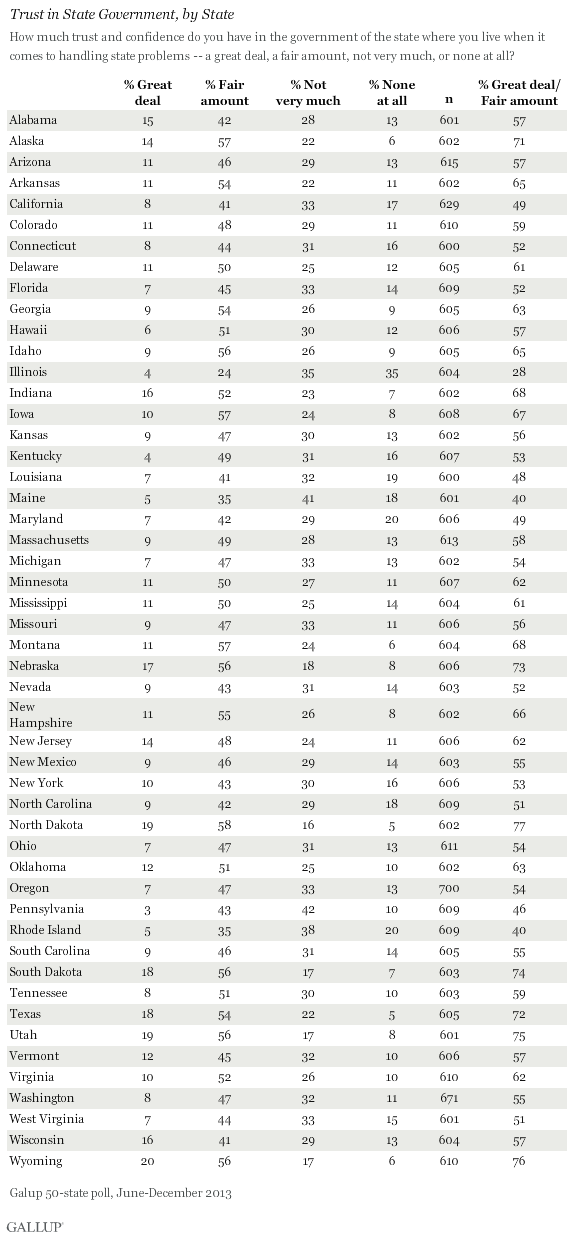PRINCETON, NJ -- Illinois residents trust their state government to handle their state's problems far less than residents in any other state. Twenty-eight percent of Illinois residents trust their state government "a great deal" or "a fair amount." In contrast, at least 75% of North Dakota, Wyoming, and Utah residents trust their state governments.
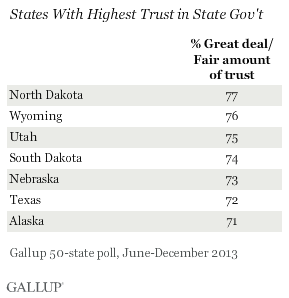
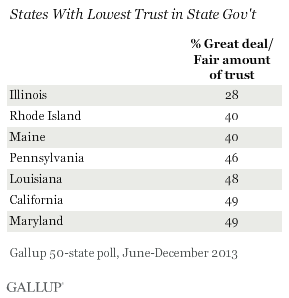
The results are based on a special 50-state Gallup poll conducted June-December 2013, including interviews with at least 600 residents in every state. This poll allows Gallup for the first time to report trust in state government at the state level. Gallup has previously measured Americans' trust in their state governments on a national basis. The most recent national estimate, from September 2013, finds 62% of all Americans having a great deal or fair amount of trust in their state government.
The accompanying map identifies states as having above-average, average, or below-average trust, compared with the 50-state average of 58%. The full results for each state appear on page 2.
Trust is generally higher in states in the upper Midwest and Plains states, and the northern Mountain region states.
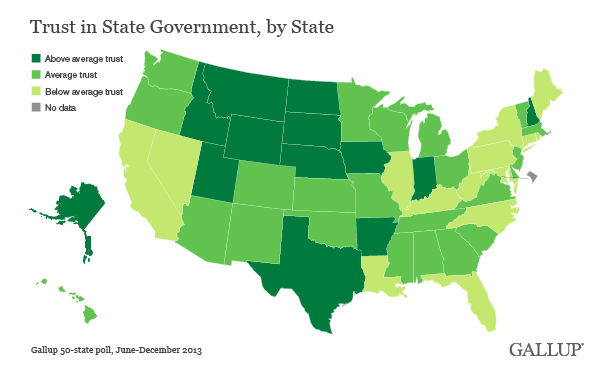
In general, trust is lower in more populous states than in less populous states. The 10 most populous states and 10 least populous states differ by 11 percentage points in state government trust, with the middle population states in between. Larger states have larger economies and more citizens needing services, and often more diverse populations, so they may be more challenging to govern than smaller states.
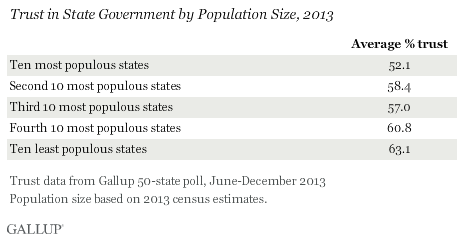
The population size-trust relationship may help explain the finding that trust in state government tends to be higher in Republican-leaning states than Democratic-leaning ones, since larger states tend to be Democratic and smaller states Republican. Using Gallup's 2013 data on state party affiliation, average trust in state government is 67% in solidly Republican or Republican-leaning states, 58% in competitive states, and 53% in solidly Democratic or Democratic-leaning states.
All of the 10 most populous states are either Democratic or competitive, according to Gallup's party affiliation estimates. The most populous solid or leaning Republican state is Tennessee, which ranks 17th in population size. North Dakota, Wyoming, South Dakota, and Alaska rank among the top states in trust and the bottom states in population, and are all Republican-oriented states. Additionally, there are many other cultural, economic, and demographic factors that correlate with population size and politics that could help explain the trust-partisanship relationship.
Although Illinois' exceptionally low trust level does bring down the averages for both Democratic states and most populous states, those groups of states would still rank lower than other states if Illinois were excluded.
Corruption a Factor in Illinois Residents' Lack of Trust
Illinois' position at the bottom of the list in residents' trust in state government is not surprising, given that its last two governors, Rod Blagojevich and George Ryan, were sentenced to jail for crimes committed while in office. Two prior Illinois governors from the 1960s and 1970s also went to jail.
Additionally, the Illinois economy remains shaky and the state government continues to struggle to balance the budget, even after a significant income tax increase a few years ago. That tax hike is set to expire, but the governor is pushing to make it permanent. Last year, the state also passed controversial pension reforms for state workers that are being challenged in court.
In addition to Illinois, in six other states -- Rhode Island, Maine, Pennsylvania, Louisiana, California, and Maryland -- less than a majority of residents express trust in their state governments. Many of these less-trusting states have had poor economies in recent years. Louisiana, like Illinois, has a history of corruption among its elected leaders.
Healthy economies are generally associated with higher levels of trust in state government. Five of the six states with the lowest unemployment rates in the nation have trust scores of 73% or greater. Vermont is the exception. Despite its low unemployment rate, just 57% of Vermonters trust their state government.
Implications
Trust in government is a key commodity for a democratic government to function well. Voters must believe that those they elect to public office will act in the best interests of the citizens, and elected leaders who do not engender their constituents' trust will likely not serve for long. Trust in state government varies widely at the state level, with population, economic, political, and historical factors all seemingly related to how much citizens trust the leaders responsible for governing their state.
Survey Methods
Results for this Gallup poll are based on telephone interviews conducted June 27-Dec. 4, 2013, with a random sample of approximately 600 adults per state, aged 18 and older, living in all 50 U.S. states.
For results based on the total sample of adults per state, the margin of sampling error is ±5 percentage points at the 95% confidence level.
Interviews are conducted with respondents on landline telephones and cellular phones, with interviews conducted in Spanish for respondents who are primarily Spanish-speaking. Each sample of national adults includes a minimum quota of 50% cellphone respondents and 50% landline respondents, with additional minimum quotas by time zone within region. Landline and cellular telephone numbers are selected using random-digit-dial methods. Landline respondents are chosen at random within each household on the basis of which member had the most recent birthday.
Samples are weighted to correct for unequal selection probability, nonresponse, and double coverage of landline and cell users in the two sampling frames. They are also weighted to match the national demographics of gender, age, race, Hispanic ethnicity, education, region, population density, and phone status (cellphone only/landline only/both, and cellphone mostly). Demographic weighting targets are based on the most recent Current Population Survey figures for the aged 18 and older U.S. population. Phone status targets are based on the most recent National Health Interview Survey. Population density targets are based on the most recent U.S. census. All reported margins of sampling error include the computed design effects for weighting.
In addition to sampling error, question wording and practical difficulties in conducting surveys can introduce error or bias into the findings of public opinion polls.
For more details on Gallup's polling methodology, visit www.gallup.com.
